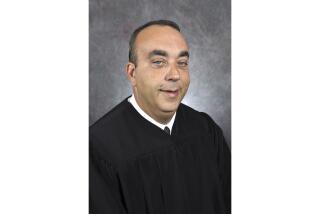Car Bomb Kills Coup Prosecutor in Venezuela
A remote-controlled car bomb killed the state prosecutor preparing to press charges against supporters of a short-lived 2002 coup against Venezuelan President Hugo Chavez, officials said Friday.
The killing of Danilo Anderson, 38, stirred concern that a fresh wave of violence could beset this country, the world’s fifth-largest oil exporter and the United States’ biggest supplier in the Western Hemisphere.
Anderson was traveling through the Los Chaguaramos district of Caracas, the capital, around midnight Thursday when his sport utility vehicle exploded. His charred body was recovered from the vehicle and identified at the city morgue early Friday, police at the scene reported.
The prosecutor had been compiling evidence against nearly 400 opposition activists who signed a declaration of loyalty to Pedro Carmona, who served two days as interim president in April 2002 before a popular revolt reinstated Chavez.
“This can only be described as terrorism,” Interior Minister Jesse Chacon said of the slaying. He added that forensic tests showed the bomb had been placed under Anderson’s seat and was detonated by remote control.
No arrests were made Friday, but early suspicion focused on opposition supporters.
Anti-Chavez activists were devastated when an Aug. 15 recall election failed to unseat the populist president. They suffered further setbacks in regional elections last month. Some observers said they feared radical elements of the opposition might resort to violence after failing to oust Chavez through the ballot box.
Atty. Gen. Isaias Rodriguez said those who were being investigated by Anderson would be suspects in the slaying.
“This is a political murder whose main objective is to intimidate the judiciary and stop the investigations he was working on,” said Information Minister Andres Izarra. He accused unnamed “terrorists” among Cuban and Venezuelan exiles in Florida of being behind the killing.
Venezuela has been in turmoil during Chavez’s nearly six-year rule.
Business leaders say the president’s policies have benefited the poor at their expense. Chavez enjoys majority support, as demonstrated by the 59% of voters who cast ballots against his recall.
After Anderson’s killing, Chavez appeared on national television to urge the nation to remain calm. “There will be peace in Venezuela, but peace must be accompanied by justice,” said the president, who canceled a trip to Costa Rica where he was to take part in an Ibero-American summit.
Anderson’s coffin was taken to the attorney general’s office in downtown Caracas for a wake. National guard soldiers in riot gear struggled to hold back an angry crowd that had gathered to denounce the attack.
Some opposition figures condemned the prosecutor’s killing. “Even though Anderson may have been an instrument of repression for this government, a terrorist attack cannot be the answer,” said Pompeyo Marquez, a veteran politician and member of the Democratic Coordinator opposition alliance.
Henrique Capriles, mayor of the capital’s Baruta district, spent three months in jail this year while Anderson prepared a case against him for his alleged involvement in the coup.
“The government and the judicial system must find those responsible and do justice,” Capriles said.
“I had many differences with Danilo Anderson, but these were fought out in the public prosecutor’s office,” he said.
Anderson was widely viewed as a Chavez ally for his handling of high-profile cases against coup plotters and opposition figures who supported a two-month national strike last year and the recall referendum.
But in a recent interview in the Quinto Dia weekly newspaper, Anderson denied any political favoritism, saying he had prosecuted cases against government supporters. He said he had received death threats from the soldiers and police accused of staging the coup and had acquired a bodyguard while investigating those cases.
Although Chavez now has firm control of the country after Oct. 31 elections in which his allies swept 20 of 22 gubernatorial posts, some analysts worry that the former army colonel will crack down on opponents.
Luis Vicente Leon, director of the Datanalysis polling firm, said it was too early to gauge the political fallout from Anderson’s death.
“One possibility is that the president uses this to further clamp down on the opposition,” the pollster said. “However, if he does try to squash his enemies, then he may further fuel the radical groups that did this, and I’m not sure that would suit him.”
Chavez is popular thanks to his “revolution for the poor” in which he deployed Cuban doctors to treat slum dwellers, sought to eradicate illiteracy and confiscated idle land from wealthy owners to give to indigent farmers.
Relations with Washington have been strained since the Bush administration recognized the coup leadership and openly supported opposition groups during the strike and recall campaign.
The Bush administration has made clear its concern over the close ties Chavez nurtures with communist Cuba, to which he ships discounted oil in exchange for relief work by Cuban doctors, teachers and engineers.
U.S. Ambassador to Venezuela William R. Brownfield denounced the killing of Anderson as “brutal and barbaric.”
“In the civilized world, there is no place for terrorist acts,” Brownfield said in a radio interview.
Special correspondent Ixer reported from Caracas and staff writer Williams from Miami.
More to Read
Sign up for Essential California
The most important California stories and recommendations in your inbox every morning.
You may occasionally receive promotional content from the Los Angeles Times.











